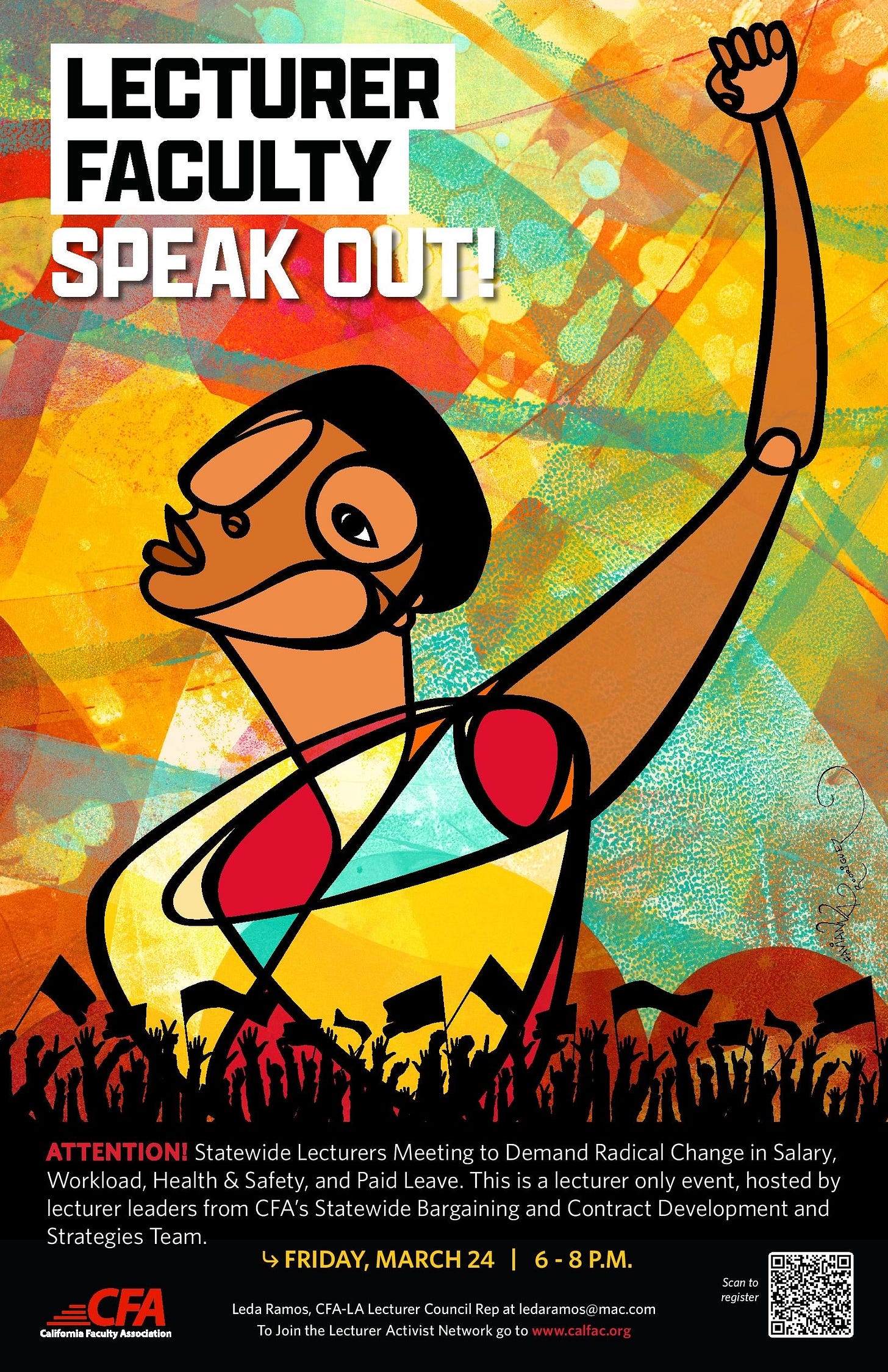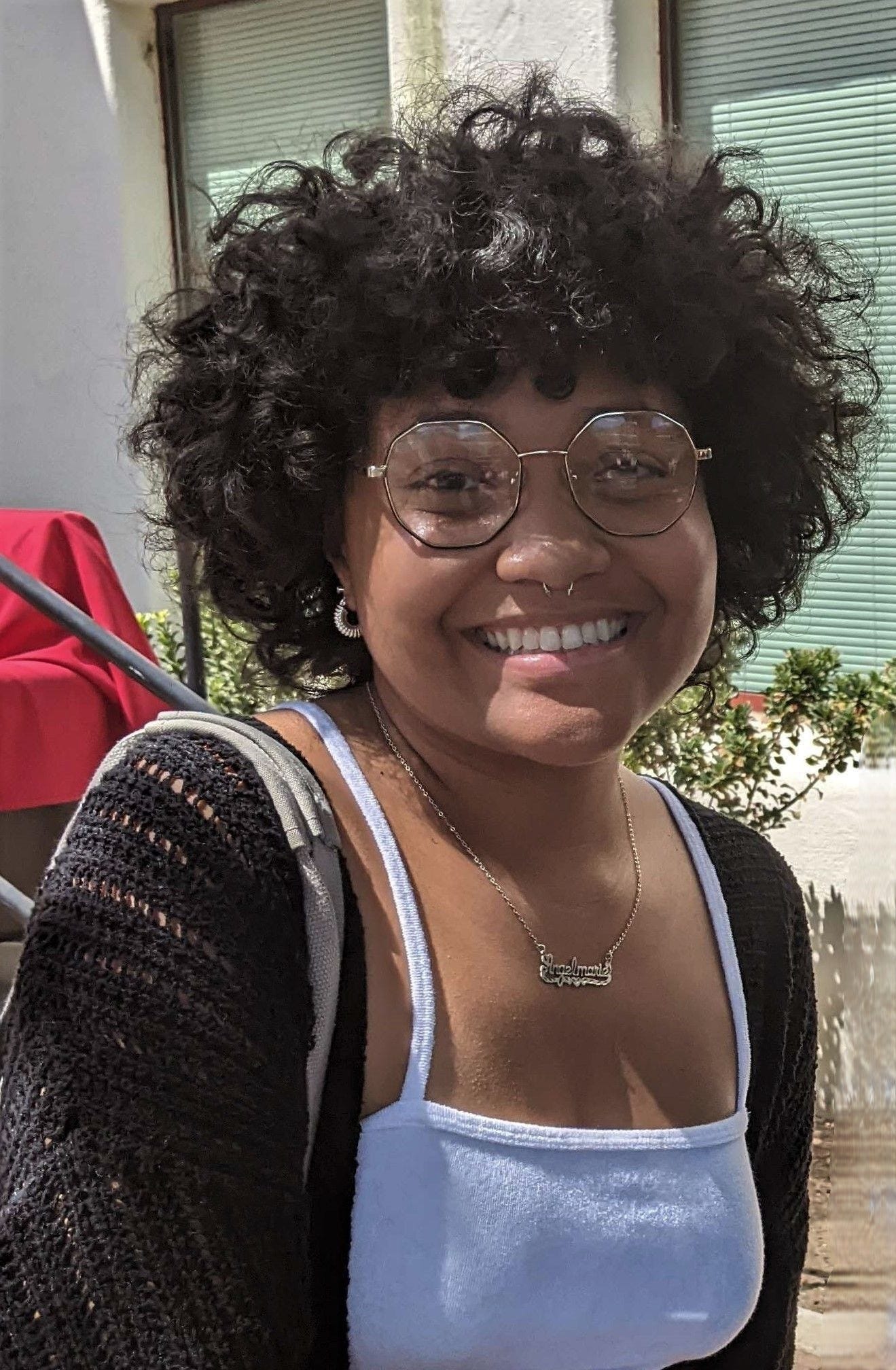A message from the Chapter President
Fellow Faculty/Academic Workers,
We finally made it to the end of a long, and arduous academic year. I wish you well in your summer endeavors and hope you have time for relaxation and restoration. At the same time, I also want to encourage those of you who will be around to participate in Open Bargaining for our Contract Reopener and the “Summer of Solidarity.'' I will outline more about these activities below.
The More Things Change…
When we return to Cal State LA in Fall 2023, it might feel like a very different campus. As you know, several senior administrators are stepping down or changing positions this summer, starting with President Covino. At the Fall 2022 Convocation, he announced his impending retirement mere months after 92% of the Academic Senate voted No Confidence in his leadership. Rather than acknowledge the discontent among the faculty, Covino sought to use the news of his retirement as a way to redirect attention and recuperate his image. The CSU Chancellor and Board of Trustees also ignored the No Confidence vote and instead “rewarded” Covino with a 29% raise–the largest increase given to campus presidents last year. As a result of his $102,000 pay increase, Covino’s base salary is now more than $451,000 per year, more than the Governor of California or the President of the United States. In addition, his housing allowance of $60,000 is higher than most Lecturer faculty members earn at Cal State LA.
Our Executive Board (E-Board) has vocally advocated for an open and transparent search for the next Cal State LA president. This is even more vital since the first attempt at selecting a new president resulted in a failed search. The Board of Trustees (BOT) asserts that the closed, secretive search process is needed to ensure a potential presidential candidate doesn’t face “backlash” from their current employer. However, all other academic administrative positions, from the Provost, AVP for Faculty Affairs, to College Deans are invited to campus for open forums. The fact that the BOT has chosen to hire the person most responsible for leading the campus community in secret means the people the new president will represent are excluded from the process. It’s particularly important for the BOT to embrace transparency in presidential searches following the recent controversies involving disgraced ex-Chancellor Joseph Castro, former Sonoma State University President Judy Sakai, and former CSU Fullerton President Framroze Virjee. In the end, the secretive process does little to engender confidence or trust in a new leader and it really only serves to maintain the status quo.
Contract Reopener & Open Bargaining
Much of our chapter’s organizing efforts during the last two semesters has been preparing for the Contract Reopener. In June 2023, we will begin to bargain over four articles: Article 20 (Workload), Article 23 (Parental Leave), Article 31 (Salary) and Article 37 (Health & Safety). On May Day, CFA’s Bargaining Team released sunshine proposals to inform management of our bargaining priorities. We are demanding a 12% General Salary Increase (GSI) in 2023-2024 for all faculty and equity increases for our lowest paid colleagues. However, interim Chancellor Jolene Koester has already said the CSU is only willing to give employees 1.77% raises! After years of high inflation and the one percent decrease of our negotiated 4% pay raises for 2022-2023, we say it's time for 12% raises and equity increases. We are also introducing contract proposals for pedagogically-appropriate class sizes and compensation (WTUs) for Lecturer faculty who engage in service. In addition, we have proposals to improve paid leave for new parents, and to guarantee campus safety and well-being for all, particularly marginalized faculty, students, and staff.
This year, CFA's Bargaining Team will conduct Open Bargaining, which invites active CFA members to attend in-person or virtual bargaining sessions. I was recently elected Chair of Contract Development and Bargaining Strategy (CDBS), and one of my main duties has been to help CFA prepare for open bargaining. It is an important practice of union democracy and labor power that encourages rank-and-file members to directly participate in the bargaining process. Also, it will expose faculty to the ruthlessness and cold nature of management's negotiating tactics. However, for open bargaining to be successful, members must show up in large numbers to demonstrate to management the seriousness of our demands. If you would like to attend, you can sign up here or email me at aratcliff@calfac.org if you need more information.
“Summer of Solidarity”
We’ve been reinvigorated by the show of solidarity and successful strikes of UAW Academic Workers in the UCs, faculty and staff at Rutgers University, staff and teachers in SEIU/UTLA, and other collective action by academic and education workers around the country. Modeled off these actions, CFA has embarked on a “Summer of Solidarity” with our sibling CSU unions: CSUEU, Teamsters, APC, and UAW. Each union is currently or will begin collective bargaining with CSU management over new contracts this summer. On May 23, 2023, hundreds of faculty, staff, advisors, skilled trade workers, and teaching assistants from CSU unions around the state descended upon the Board of Trustees meeting in a show of unity and force. We are encouraged by the increased militancy of our union siblings as several of them are organizing their members to be “strike ready” in the likely event that CSU management denies them fair contracts and living wages. Faculty at Cal State LA can show solidarity with our CSU union siblings by learning more about their demands, attending their rallies and actions, AND by becoming “strike ready” ourselves.
At Cal State LA, CFA has been a driving force in our campus’s Labor Council made up of our union siblings. In Fall 2022, we helped launch the monthly “Unity Wednesdays” with CSUEU, where we table, wear our union colors, and engage with our members and students from across campus. Our monthly tabling events have grown to include the Teamsters, APC, and Students for Quality Education (SQE). In addition to showing our union siblings that we’re in solidarity with them, Unity Wednesdays also demonstrate to management our growing labor power on campus. We have had a great response each time we’ve been out in front of the Library and it’s encouraging to see more of you wearing CFA red. Solidarity with our union siblings and student organizers is the best way to make the People’s University more just and equitable. This will necessitate that we stay united as fighting unions, unafraid to demonstrate our collective power to management. Because when we fight, we win!
Anthony Ratcliff, Chapter President, CFA- Los Angeles
Faculty Rights - that’s right!
Molly Talcott, Faculty Rights Chair
A lot of our union’s work advocating for faculty rights remains relatively unknown to members for two main reasons: (1) faculty rights work is confidential; only grievants may share their stories of struggle – CFA advocates cannot; and, (2) the pace of the work is slow, and results can take months or years to produce. For example, a workload grievance about maintaining course caps from Fall 2020 is just now making its way to arbitration. CFA accepts all dates the CSU offers to meet with the arbitrator, but oftentimes, the CSU is the slow party to respond. Stay tuned for updates on that important, ongoing workload grievance!
However, the turtle-like pace of faculty rights can also produce some victories that seem to come out of nowhere, but actually are achieved through steady efforts over a considerable period of time. For example, last year, we filed so many grievances on behalf of faculty who were denied sabbaticals and early tenure, despite having received favorable reviews from their deans. We issued information requests to detect troubling patterns and possibly contractual violations. Last spring, we won reversals on some of those early tenure and sabbatical denials. This year, perhaps anticipating the fight CFA put up last year, Cal State LA management approved more sabbatical applications (beyond the minimum 12%) at the outset. And as of this writing, we have not been contacted by any faculty members who were denied retention, tenure, or promotion (including on an early timeline).
It always matters that we speak out – and file grievances – when our rights are violated!
Lecturers’ Council Report
Leda Ramos, Lecturers’ Council Representative
I am committed to CFA Lecturer Council Representation and Solidarity work for the sixty-eight percent of faculty teaching at Cal State LA aligned with our CFA-LA EBoard and as a statewide rep for the next two-year term (2023-2025). In the Spring Lecturer faculty rights education focuses on the RTP Evaluation and “How to Write a Rebuttal.” Many Lecturers experience the indignity of faculty evaluations that unfairly distort the quantitative data of the Student Opinion Surveys which deeply harms Lecturers and dismantles the work health of departments, and my work is to listen, acknowledge, then strategize with Molly Talcott, Faculty Rights Chair and Marcelle Alvarado, our CFA Field Rep. to reduce harm and educate Lecturers on their faculty rights. Our collective CFA-LA and Academic Senate advocacy for new lap top computers for Lecturers on 3-year contracts fell on deaf administrative ears.
I continue to work in solidarity with our fellow Tenure faculty and staff on work conditions on campus and recently lead a May Day 2023 Press Conference to “Protect BIPOC Academic Workers” with many campus and community leaders fighting racial and economic inequity on campus. I work within our university shared governance space as an Academic Senator for the College of Ethnic Studies and as a member of the Academic Senate Executive Committee to represent Lecturer teaching and work conditions. I fight against antiBlackness culture on campus within faculty and administrative spaces . This Spring and Summer I am actively working with the CFA state-wide Lecturers' Action Network and Contract Development & Bargaining Strategy Committee.
Membership + Organizing
Akhila Ananth & Oli Rodriguez, M+O Chairs
The energy for CFA Membership + Organizing has been through the roof! We tabled with CSUEU, the Teamsters, and APC four times this semester, and even got snowed on once! We also were out hall-walking with coffee, drinks, donuts, and other treats four different times through Simpson Tower, Engineering, King Hall, and LaKretz Hall.
We’ve connected with faculty who hadn’t yet signed up for CFA membership and riled up those who hadn’t considered being more active in the union. In addition, our department representatives and CFA activators have been busy sending their colleagues emails and connecting the executive board to the struggles in each department. We have to believe all this momentum will serve us well as the contract opens up for bargaining and we begin fighting for what we deserve: better pay, reduced workloads, longer parental leave, and getting cops off campuses.
Join us next semester for Unity Wednesdays with our fellow union siblings representing staff workers, every first Wednesday of the month - and wear your CFA red!
APIDA Call to Action: Senate Bill 403
Last month, the California Senate approved the passage of SB 403, a bill introduced by Sen. Aisha Wahab that would ban caste discrimination in California! The bill is now in the Assembly appropriations committee and then will go to a vote in the Assembly. As CSU faculty, we already boldly pushed for caste to be included as a category of discrimination in the CSU system last year. Outside our campuses, however, dominant caste Hindus and their conservative supporters have been extremely vocal against the passage of the bill, despite recent lawsuits and rampant reports of caste discrimination in the tech industry in this state. This bill is important because when it passes in the world’s 5th largest economy, California, it will be a massive blow to fascist ethnonationalism in India.
We are encouraging our members to support SB 403 at every juncture until its passage. One way to support is to sign this petition, which we are hoping will hit 10,000 signers before the bill hits the assembly floor. Another way to support is to follow @equalitylabs on all social media platforms and subscribe to their newsletter for updates and action items on the bill. Finally, you can pass along this information, call your state senators and assemblypeople, and attend actions planned across the state the first week of June to make sure SB 403 gets passed.
The APIDA (Asian Pacific Islander Desi American) Caucus will continue it’s tradition to host luncheon’s during the semester. Be on the look out for our invitation!
LGBTQIA+ Caucus Update
We attempted to build community by offering a non-work-related event at Highland Park Bowl. Attendance was low, but we also could have done a better job of promoting. We also started a discord server to help provide an open forum and digital meeting space for LGBTQ+ faculty to meet, chat, and share. We can promote this further in the next Academic Year as another way to spread information and continue to build community. Going forward, we are interested in exploring ways in which the caucus can better support our LGBTQ+ faculty, especially our faculty of color and other minoritized groups, through planned events, supporting on-campus events and activities that relate to our interests, and creating spaces for conversation and activism.
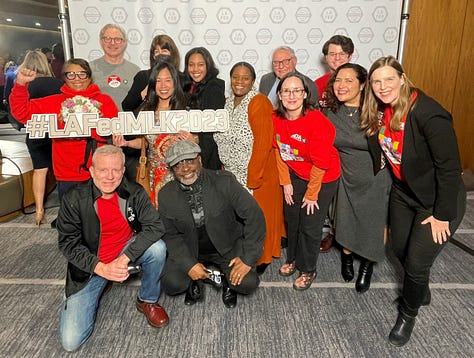

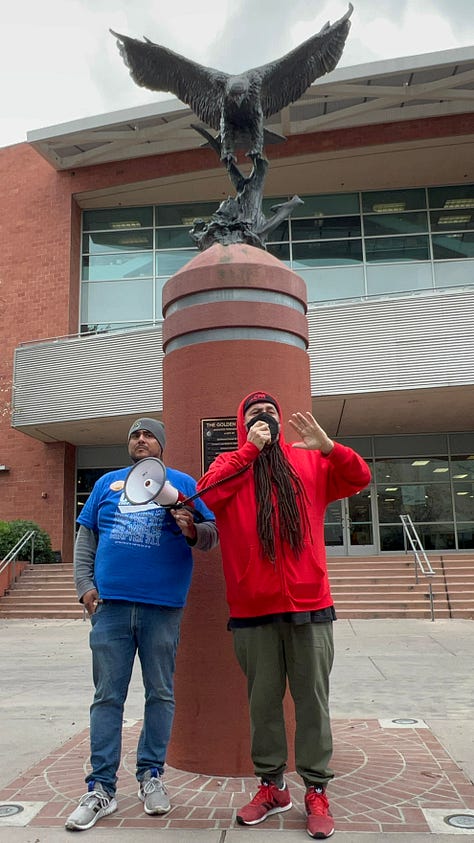
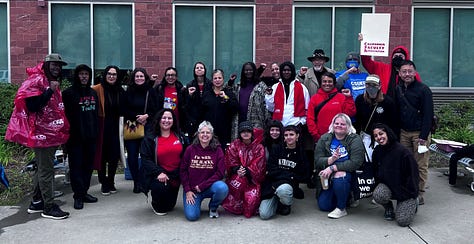
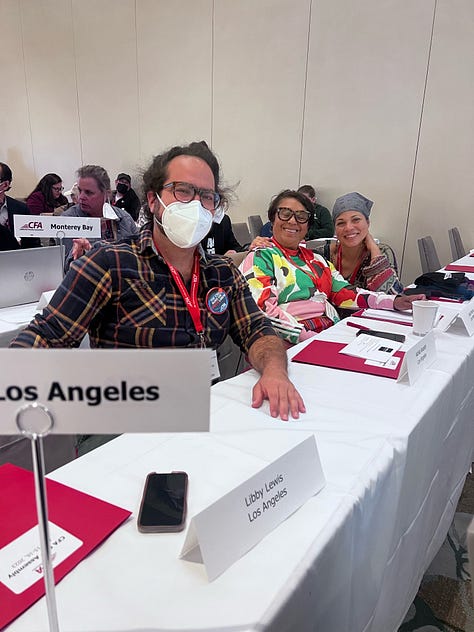
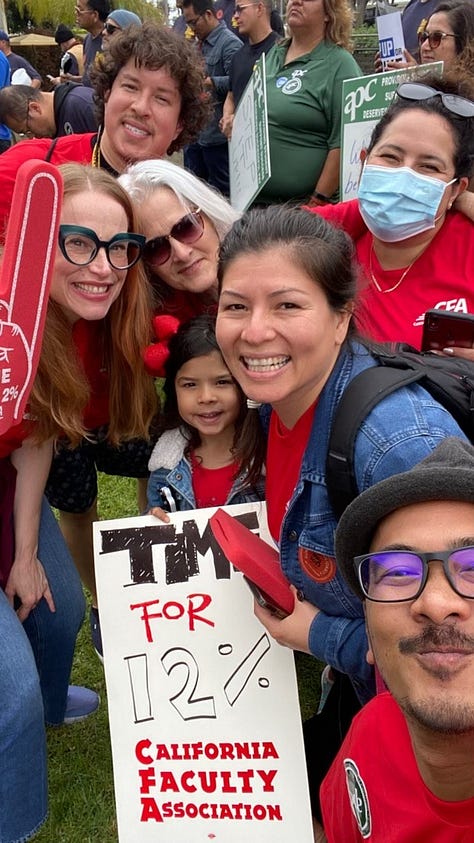
Chairs Caucus
Chairs met in Fall and Spring semesters to share and compare information across colleges. We discussed a number of topics that affect students’ learning conditions and faculty working conditions.
Workload Issues
Workload issues came up frequently throughout the year with regard to the following:
Office staff shortages and chairs doing the work of ASCs and ASAs. Chairs discussed the possibility of individual chairs filing grievances, but no individual chairs did file a grievance that we know of.
Cal State LA has an onerous and unworkable telecommuting policy for staff
Very late deadlines from Central Administration that caused chairs and ASCs to have to complete work on very short timelines. E.g., only a week turnaround time to submit hiring plans. Deadlines that make more work for chairs also make more work for faculty who have to participate in unscheduled, last-minute meetings.
Curriculog was a continual item of discussion throughout the year. It is clear that the database itself and lack of staff in the office of undergraduate studies drive the unrealistic deadlines that chairs and faculty have to meet to have curriculum approved.
There is no communication about changes in procedures within curriculog or requirements to use new forms that have been added without communication to chairs
The overall slowness of implementing curriculum (a 1.5 to 2-year window until a modified or new course can be offered) directly affects students’ learning and it affects faculty RTP. Faculty cannot create and offer courses in their research areas and be assured that the course will make. Special topics courses as a stop-gap solution until a course can be implemented do not work effectively as communication with students and advisors is difficult, haphazard and incomplete. Students don’t know about the course, or don’t know what requirements it fulfills in the major. Students cannot take courses that have new, cutting-edge knowledge that they need for their careers.
Chairs decided to invite the Associate Dean of Undergraduate studies to college chairs meetings to discuss processes. Hopefully this will happen in college meetings during summer 2023. Once chairs in colleges have met with the AD of UGS they will make requests (to Academic Senate and to the Provost) for changes in policies and procedures.
Chairs are treated as implementers of directives from deans and central administration. There is no effort to problem-solve or address lack of efficiency in university processes and procedures.
Student forms for example are handled by email (though some few are now online; but chairs haven’t been notified of this) which places a burden on students, chairs, and faculty. Students who are stressed already, as a reason for withdrawing from classes often given up because the process is too cumbersome. Instead they take and F or WU grade which affects their motivation and GPA. Chairs have to process multiple emails with students and multiple faculty. Besides being inefficient (with emails being overlooked) it results in hours and hours of time that chairs and faculty could be using to serve students and carry out their research.
Transparency
Administration is not transparent about budgeting; they do not communicate deadlines in a timely manner (besides RTP there is no university calendar for annual processes and procedures: application for awards, fellowships, sabbaticals, submission of hiring plans)
Chairs do not have access to the data warehouse
Lack of Communication
Central administration never communicates about new procedures.
Training for databases (e.g., Curriculog) is haphazard at best.
CAPS Updates
The CAPS (Counseling and Psychological Services) Center won an important victory this academic year, when they organized and asserted their faculty rights against a toxic work environment created by a bad manager, and as a result, no longer with the university. The CAPS Center suffered several resignations, and is slowly recovering (see, Cal State LA’s counseling center has a retention problem by former CAPS Counselor, Jeniffer Reyes). While President Covino has repeatedly stated a budget to fund 16 counselor faculty, Cal State LA’s CAPS Center is staffed with less than half at 7 counselors - all on temporary 1-year contracts. CFA-LA continues to advocate for tenure-line conversions and hiring of additional counselor faculty to meet the state’s recommended 1:1500 counselor to student ratio.
The infographic below describes counseling ratios in 2019. Since then, Cal State LA is now in the top 2 worst staffing levels in the CSU system. Our students deserve better!
Access to CAPS: A student testimony about campus mental health services
Even though Cal State LA has one of the worst counselor to student ratios, CSU Channel Islands has become one of the best. Angelmarie Taylor shares the following testimony expressing the importance of campuses meeting the needs for student mental health services that Cal State LA should learn from.
My name is Angelmarie Taylor, and I am a 4th year business major at CSU Channel Islands. As we currently stand, we are one of the very few CSU's that meet the IASC (International association of counseling services) recommendation for students to counselors ratio. 1,000-1,500 students for 1 counselor.
Having been a student here for four years, I very clearly remember what it was like before we met this ratio. Wait times were anywhere from 4-6 weeks. For me, only being able to see a counselor once a month was not effective, especially since I had just been released from a mental hospital for emergency mental health needs. I was still struggling, both personally and academically.
Now that we have more counselors, I have been able to speak with a counselor every week. Outside of CAPS hours, I take advantage of our 24/7 mental health crisis line to receive immediate help, and get connected in-person with a CAPS counselor the very next day.
We've also implemented a new program such as our mental health peer program (MHPP), and designated staff members to connect students to off-campus psychiatrists for medicinal purposes. I've felt so supported, and it has made a significant in my grades and overall well being.
Attending a CSU that meets the IASC ratio has been life changing. It's hard to image us ever going back, and letting go of accessible, vital mental health services that we need to get through our college experience. Every CSU needs to meet this standard, so that no student need to worry about mental health support. There is more than enough on our plate.
Librarians & Workload
It is not a secret that the University Library has faced retention challenges and has lost many of our staff siblings represented by CSUEU during the pandemic. Librarian faculty are also feeling the burden of under resourcing with less than 20 librarians supporting nearly 30,000 students and over 1,700 faculty. Workload and overwork concerns are everywhere: librianship, research, and service - excess service makes all other responsibilities difficult to meet. Currently, there is not adequate support, flexibility, or professional development from library and university administrators.
In 2022, Cal State LA library faculty won a significant settlement for grievances filed on workload violations from years prior. As we know, history has a tendency to repeat itself and it appears we are heading in the same direction towards grievance and arbitration procedures. When polled, the average work satisfaction rating from Librarian faculty was a 2.7 out of 5. Will Cal State LA learn? Short by about 5 Librarians, only 2 positions were approved for hiring for the next academic year.
Our working conditions are our student’s learning conditions
This past semester, Spring 2023, the CFA-LA Executive Board drafted and adopted a resolution to address workload concerns across the board at Cal State LA. The resolution calls for equitable campuswide WTU allocation for teaching and service for tenure-line, tenured and Lecturer faculty, the conversion of counselor faculty to the tenure-line, and overall administrative accountability.
Similar CFA workload resolutions have been adopted by Cal Poly Pomona and San Jose State’s academic senates.
With an overwhelming 92% approval rate, Cal State LA faculty agreed to endorse this resolution in May 2023. For the full resolution, read the CFA-LA Resolution in Support of Workload Relief for Cal State LA Unit 3 Faculty here.
To get involved, sign up for statewide action network: https://actionnetwork.org/forms/take-action-to-build-faculty-power/.
What we’re reading
The Virtuous Professor? Essay by Brandy Daniels, David Farina Turnbloom
Just as I had come to understand, over time, what my professor was telling me when he urged me to not go to graduate school, I am now—three years into my tenure-track job—beginning to understand why a person would leave their position as a tenured professor.
Resisting Surveillance, Practicing/Imagining the End of Grading by Madore, Zeemont, Burgos, Guskin, Lam, Stella at CUNY
We do not believe that grading is something that can be made more fair, just, or anti-racist. To resist surveillance in higher education is to embrace the end of grading… an overview of these contexts and assertions, we offer a series of reflections, tracing juxtaposing moments where we individually or collectively taught, learned, and/or organized outside/against grading systems.
No More Police: A Case for Abolition by Mariame Kaba, Andrea J. Ritchie
Centering survivors of state, interpersonal, and community-based violence, and highlighting uprisings, campaigns, and community-based projects, No More Police makes a compelling case for a world where the tools required to prevent, interrupt, and transform violence in all its forms are abundant.
Labor Solidarity Corner
Thousands of local hotel workers move closer to a strike: ‘Living in LA is no longer an option’: A strike during the height of tourist season would cause temporary disruptions but probably would have no long-term effect, said Carl Winston, a professor and director of the Hospitality and Tourism management program at San Diego State.
Rutgers Unions Suspend Strike After Big Gains: “We’re not settling until they get their core issues addressed,” said Amy Higer, president of the separate part-time lecturers’ union.”
Thousands of early-career NIH researchers forming union for first time: “Push for better pay and benefits among the US scientists arrives at the world’s largest biomedical funder.”
SQE - Los Angeles is currently hiring 1 Intern. Deadline has been extended through July. Applications available online.






